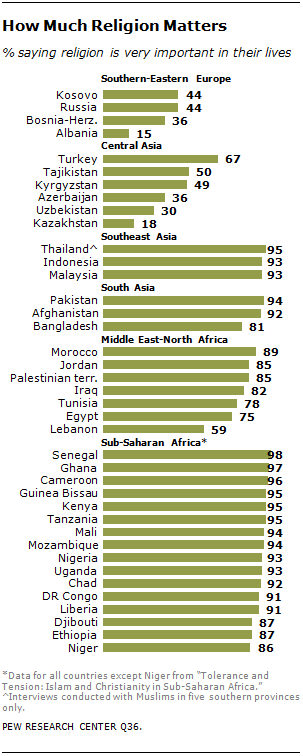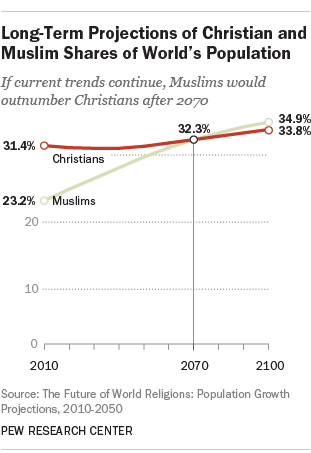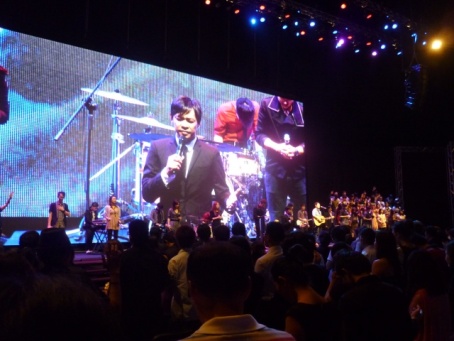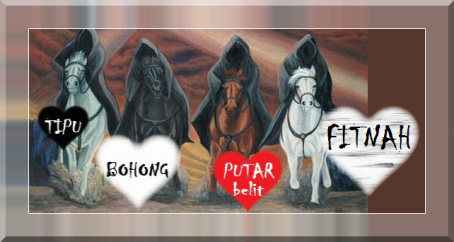Malaysia is among the top countries in the world where its Muslims say religion is very important in their lives, a survey by the Pew Research Center has found.
We are right up there in the highest tier at 93 percent for saying Islam matters most in life, sandwiched between Afghanistan (92%) and Pakistan (94%) – see bar chart below.

By 2050, Muslim numbers will nearly equal Christians
“Muslims are the fastest-growing religious group in the world,” according to demographic projections by the Pew Research Center in a report recently on Dec 7.
Christians will still remain the largest religious group, however, over the next four decades.

By the year 2050, there will be near parity in total number between the world’s Muslims (2.8 billion) and and Christians (2.9 billion).
This likely scenario of Muslims at 30 percent of the global population versus Christians at 31 percent would be a historical first.
LINE GRAPHS — below
2010-2050: Population growth projections of major faith groups

The poor ~little~ Buddhist
Buddhists are such a mercifully small group — genuinely meek and mild. Compare with Christians who make up 31.4 percent of the world population currently (see graph above).
In fact, going by absolute numbers, Buddhists will remain a stagnant population over the next half century.
As a share of the religious population worldwide, the percentage of Buddhists is projected even to shrink from “ONLY” – see line graph above – 7.1 percent today to a mere 5.2 percent in 2050.
Bar chart below below shows negative growth (-0.3) for Buddhists.

Clash of Civilizations
It is bound to happen in Malaysia.
This is because Malaysians are very religious and Malays even more so. At 86 percent level of support, Malaysia ranks among the world’s Muslim countries strongest in favour of sharia as the paramount law of the land.
Percentage of Muslims who want sharia as their country’s official law
A cross-sectional sampling:
- Afghanistan – 99%
- Malaysia – 86%
- Indonesia – 72%
- Uganda – 66%
- Tunisia – 56%
- Chad – 47%
- Tanzania – 37%
- Lebanon – 29%
- Kazakhstan – 10%
Source: Pew Research Center, 2013
Muslims will eventually overtake Christians
Christianity, which has traditionally been the world’s foremost faith, is being challenged by Islam for preeminence.
In terms of size, the Muslim flock is fast catching up with the Christian sheeple.
By the year 2070, Muslims will very probably outnumber Christians, the Pew study forecasts (see line graph below).

Mega churches in Korea, S’pore and Jerusubang
So in one corner of the ring, we have the very religious Malay Muslims. In the opposite corner, there are the evangelical Christians who are largely the well-to-do Chinese.
As one example, the Calvary church in Bukit Jalil – southeast Asia’s biggest – is comprised of middle and upper middle class Chinese forming the majority of its congregation.
According to the Center for the Study of Global Christianity, evangelical Christians belonging to the Chinese, Indo-Malay and Korean cultural traditions comprise a quarter (24.6%) of the world’s evangelical Christian population.
The centre’s data – below – however refers to the period in mid-2005, i.e. a decade ago. The present ratio is possibly much higher.
Click to enlarge

Money talks: Evangelistas have the financial capital for politics
“The majority of Pentecostals [evangelicals] in urban centres like Kuala Lumpur, Singapore, Surabaya, Jakarta and Manila are, with some notable exceptions, upwardly mobile, middle-class ethnic Chinese,” said researcher Terence Chong who is a Senior Fellow at the ISEAS-Yusof Ishak Institute.
They are Chinese because this form of evangelism allows for “identity-consolidation in Chinese-minority societies where these churches are seen as alternative places to a less than welcoming political climate,” says Dr Chong in his 25 Sept 2015 article published by the ISEAS Perspective bulletin.
Evangelical churches are also an important place for the Chinese to do their business networking in addition to providing contact opportunities for professionals. Hence it is this “ability to mobilise financial capital” that – in one aspect – enables these Chinese minorities to conflate religion with politics.
BELOW: Oh look, Pastor Kong Hee of the City Harvest church Singapore is his country’s newsmaker of 2015

Chinese evangelistas and their Subang Jaya hub
While Singapore is on the ball researching and monitoring the phenomenon of evangelistas and their explosive growth, Malaysia is typically tidak apa. This could have something to do with the fact that Jakim’s staff are conversant primarily in bahasa Melayu.
LOOK AGAIN!
Can you recognize who’s standing on stage in the City Harvest church of Subang Jaya?

It’s the Mama mia, hallelujah!
The language barrier allows English and Chinese-speaking evangelistas of Jerusubang – who are certainly sneaky and savvy enough – to fly under the radar of Malaysia’s religious authorities although Bukit Aman, at least, seems to be somewhat aware.

Born Again Christians who’ve lost their Chinese self-identity
According to Terence Chong, “More recently, studies commissioned by ISEAS-Yusof Ishak Institute show that the political marginalisation of Malaysian Chinese has endowed Pentecostalism [evangelism] with the capacity to act as a vehicle to consolidate Chinese identity as a modern and individualised subject within the country”.
“It is also noted that in a nation where Muslims are in the majority, Malaysian Chinese are differentially inclined to Christianity and specifically the Pentecostal church where the church and its various groups provide social solidarity and support,” Dr Chong added.
Just like Muslim has become the main identity marker for Malays, Christian has become the identity marker for Born Again Chinese in Malaysia.
BELOW: “My child is neither Chinese nor Indian” but she’s definitely Christian — Hannah Yeoh
PM @NajibRazak pls look into this, my child is neither chinese nor indian. She's Malaysian.

Chinese and their evangelism unsettling the Muslim majority
Malays feel besieged because the evangelistas are so very aggressive in their missionary zeal. And not to mention truly sneaky too.
“Not only is it [evangelical Christianity] predominantly ethnic Chinese driven, hence, making it a convenient marker of ethnicity in multicultural societies, it also appeals to non-Chinese and indigenous communities, thus raising sensitivities over proselytization, especially in Malaysia and Singapore,” cautioned Terence Chong.
Reactions from the majority faithful signal that the “proselytism of evangelical and Pentecostal Churches often triggers reactions from radical groups and other communities” – see Vatican Insider, 3 Nov 2015.
The VI article further warned, “In areas where Christianity is usually a minority religion, this can encourage the formation of radical and fanatic groups that cannot wait to unleash anti-Christian violence”.

ABOVE: The evangelistas are most vocal in slandering and denigrating Islam.
-helenang


No comments:
Post a Comment
Note: Only a member of this blog may post a comment.